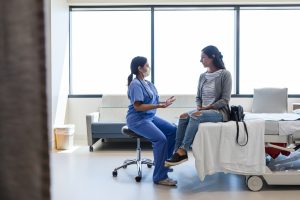 Older adults face a higher risk of experiencing depression than younger people. However, this does not mean that depression is a normal part of aging. Like many other health problems that can develop as we get older, depression is a medical condition that needs to be managed and treated under the direction of a doctor.
Older adults face a higher risk of experiencing depression than younger people. However, this does not mean that depression is a normal part of aging. Like many other health problems that can develop as we get older, depression is a medical condition that needs to be managed and treated under the direction of a doctor.
It may not always be clear whether what you’re experiencing is depression. It’s normal to feel sadness over things such as major life changes, difficulty coping with long-term medical conditions, or the loss of loved ones as we get older, even if that sadness lasts for a long period of time. However, this feeling of sadness is not necessarily the same thing as depression. Some signs that you may be depressed include:
- Loss of interest in activities you previously enjoyed
- Frequent negative feelings, such as hopelessness, guilt, or low self-esteem
- Fatigue and difficulty with thinking and concentrating
- Overeating or loss of appetite
- Insomnia or excessive sleeping
- Frequent aches and pains that do not improve with treatment
- Thoughts of suicide
While most older adults do not experience depression, those who experience chronic health conditions are significantly more likely to develop it. According to the Centers for Disease Control and Prevention (CDC), approximately 5% of older adults in general are depressed, but this number rises to 13.5% in people who require home health care and 11.5% in those who are hospitalized.
Healthy lifestyle habits such as regular physical exercise, a balanced diet, sufficient sleep, and frequent socialization are all helpful for preventing depression or coping with its symptoms as we age. Additionally, most older adults who experience depression respond positively to treatment that includes psychotherapy, antidepressant medication, or both.
You can receive treatment for depression from a psychiatrist at Flushing Hospital Medical Center’s Outpatient Psychiatric Clinic. To schedule an appointment, please call (718) 670-5562.
All content of this newsletter is intended for general information purposes only and is not intended or implied to be a substitute for professional medical advice, diagnosis or treatment. Please consult a medical professional before adopting any of the suggestions on this page. You must never disregard professional medical advice or delay seeking medical treatment based upon any content of this newsletter. PROMPTLY CONSULT YOUR PHYSICIAN OR CALL 911 IF YOU BELIEVE YOU HAVE A MEDICAL EMERGENCY.




